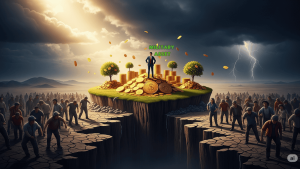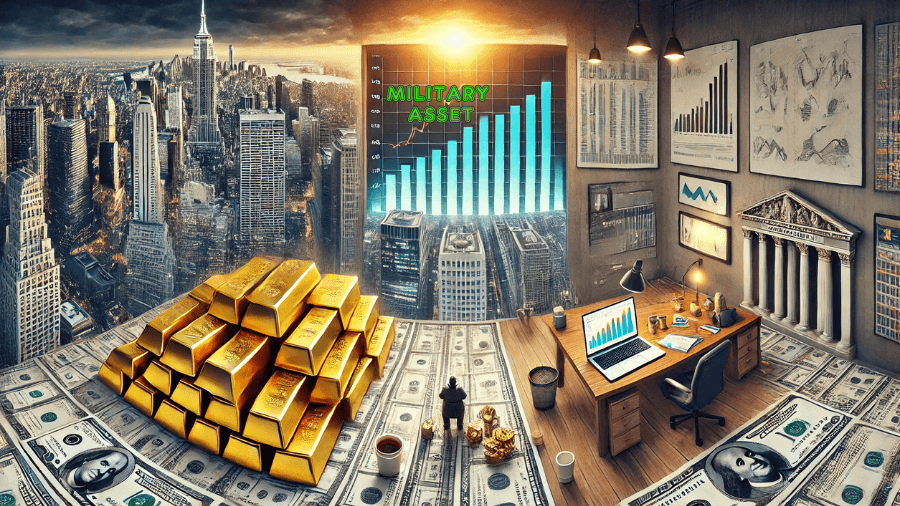Survival of the Richest: When Economic Downturns Hit, Only the Wealthiest Thrive
Economic downturns devastate average citizens, yet the richest often prosper.
When the economy stagnates, the gap between rich and poor widens dramatically.
Why is it that during financial crises, only the richest seem to survive—or even thrive?
Learn the reasons behind this phenomenon and discover how you can increase your own financial resilience.
Explore why downturns favour the wealthy, and how you can improve your financial resilience.
Introduction: Why Do the Rich Get Richer During Economic Downturns?
It seems brutally unfair but undeniably true: when the economy goes south, the rich don’t just survive—they often come out stronger.
While average people lose jobs, homes, and savings, the wealthiest frequently benefit from downturns, expanding their wealth and power.
This isn’t coincidence—it’s structural.
We call it the “Survival of the Richest”.
In periods of economic stagnation and decline, wealth concentration grows significantly. B
ut why exactly do downturns favour the wealthy, and how can you protect yourself financially during these challenging times?
Let’s unpack this phenomenon step by step.
1. Why Economic Downturns Benefit the Rich
Economic downturns are financially devastating for most people.
Yet, for the richest, downturns often present unique opportunities:
Buying Assets Cheaply
- Market crashes allow wealthy investors to buy stocks, real estate, and other valuable assets at discounted prices.
- While average people struggle financially, rich investors have the liquidity to purchase distressed assets cheaply, positioning themselves for huge profits when the market recovers.
Access to Credit
- During downturns, banks tighten lending for average citizens but remain accessible for the ultra-wealthy.
- Rich individuals can borrow cheaply, leveraging low-interest rates to expand businesses and investments during downturns.
Financial Stability and Liquidity
- Wealthy people typically have large cash reserves, allowing them to weather economic storms comfortably.
- They’re not forced to sell assets at loss or borrow at high rates, unlike less affluent individuals who often experience severe financial strain.
2. Why Average People Suffer During Economic Downturns
Unlike the wealthy, average citizens often find themselves extremely vulnerable during economic declines:
Job Loss and Reduced Income
- Economic downturns lead to widespread layoffs, wage cuts, and job insecurity.
- Without significant savings or diversified income streams, average families struggle quickly.
Debt and Limited Financial Safety Nets
- Average citizens often carry significant debt (mortgages, car loans, credit cards), leaving little room for financial setbacks.
- With limited cash reserves, a sudden income reduction quickly triggers severe financial difficulties.
Forced Asset Sales
- Without adequate savings, average people must liquidate assets (stocks, property, retirement accounts) at lower market prices—further impoverishing themselves.
3. Historical Evidence: The Rich Thrive During Crises
Historical economic crises highlight the “Survival of the Richest” phenomenon repeatedly:
- Great Depression (1929–1939):
Wealthy families acquired substantial assets at low prices, further widening wealth inequality. - 2008 Financial Crisis:
Banks and wealthy investors received significant government bailouts, enabling them to thrive post-crisis, while millions lost homes, jobs, and savings. - COVID-19 Pandemic (2020–2021):
The ultra-rich increased their wealth by trillions of dollars, while ordinary people faced unemployment, lost small businesses, and economic hardship.
These examples demonstrate a clear, consistent pattern.
4. Structural Reasons for Wealth Concentration During Downturns
The system itself creates conditions favouring the rich:
Government and Central Bank Policies
- Stimulus measures often benefit large corporations and wealthy investors disproportionately.
- Low interest rates allow wealthy investors cheap borrowing to accumulate even more assets.
Unequal Access to Information and Resources
- Wealthy individuals often have better access to financial information, advisors, and opportunities, allowing strategic decision-making during crises.
- Average citizens often lack timely access to crucial economic information and expert guidance.
5. How Can Average People Protect Themselves?
While the wealthy have structural advantages, average citizens aren’t entirely powerless:
Diversify Your Income Sources
- Multiple income streams reduce vulnerability if one disappears.
- Invest in side businesses, freelance work, online ventures, or skills training to enhance employability and resilience.
Build Emergency Savings and Liquidity
- Having 6–12 months of living expenses in cash can significantly reduce financial stress during downturns.
- Emergency funds help you avoid forced asset sales or high-interest borrowing.
Reduce Debt
- Prioritise paying down high-interest debts aggressively.
- Lower debt levels increase financial flexibility during economic downturns.
Invest Prudently
- Diversify investments globally to avoid overexposure to your local economy.
- Invest in stable assets like quality bonds, dividend-paying stocks, and real estate in economically stable regions.
6. Policy Changes: Creating a Fairer System
Beyond individual actions, structural reforms are necessary to reduce the “Survival of the Richest” phenomenon:
- Progressive Taxation: Ensuring wealthy individuals and corporations pay their fair share.
- Better Social Safety Nets: Improved unemployment benefits, healthcare, and financial support during crises.
- Fairer Economic Policies: Government stimulus should directly support small businesses and households, not just banks and corporations.
7. Ethical Perspective: Wealth, Power, and Responsibility
The richest aren’t necessarily villains—they operate within the rules society created. Yet, wealth inequality has significant ethical implications:
- Greater wealth comes with greater responsibility: Wealthy individuals and corporations should actively contribute to social stability, fairness, and economic resilience.
- Economic justice benefits everyone: Reducing inequality creates a more stable, prosperous society, benefiting both rich and average citizens.
8. Real-Life Examples of “Survival of the Richest”
Prominent billionaires often become significantly wealthier during downturns:
- Jeff Bezos and Amazon: Massive growth during COVID-19 due to increased reliance on online shopping.
- Warren Buffett: Historically buys heavily discounted stocks during recessions, profiting enormously during economic recoveries.
- Elon Musk: Grew wealth significantly amid pandemic-induced tech-stock surges.
Their success underscores how economic downturns disproportionately benefit the already wealthy.
Conclusion: Escaping the Cycle
The uncomfortable truth is clear: economic downturns heavily favour the wealthy—leading to greater inequality. However, awareness and action provide protection for average citizens:
- Build financial resilience: Diversify income, reduce debts, increase liquidity, and invest wisely.
- Demand structural fairness: Advocate for policies that address inequality and support economic justice.
Ultimately, understanding the “Survival of the Richest” phenomenon allows you to better protect yourself financially—and advocate for economic systems fairer for everyone, not just the wealthiest.


























